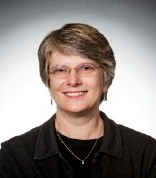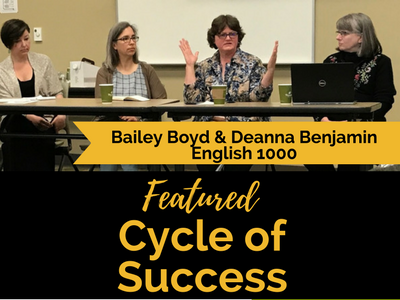Last year, Cindy Cotner served as the Interim Head of Instructional Services at Ellis Library and oversaw a pilot program where new teaching assistants in the English department were each matched to an individual librarian for library instruction and research assistance for their sections of English 1000, the first-year writing course required of Mizzou students. Due to the success of the program, it has been expanded this year, with every English 1000 instructor matched to a librarian for their courses.
In April, Cindy and Anne Barker presented “Bringing the Library into the Classroom: Rethinking Library Resources” with Deanna Benjamin and Bailey Boyd, the English 1000 instructors they worked with, at the MU Composition Program’s Celebration of Writing and Teaching.
Collaboration with librarians is nothing new for Deanna Benjamin, a PhD candidate who, in addition to teaching a variety of courses here at Mizzou, has taught in St. Louis since 2008. Cindy co-taught two sessions regarding the research process with Deanna in her classroom. During the first class session, the class worked on “an exercise that connected Cindy’s introduction to the library and research with the semester research project.” They opened the second class session with a Q&A and then “visited with students individually while they all conducted research online.” Deanna says, “Our collaboration in class helped the students ask a variety of research questions that at least one of us was able to answer.”
When the students presented their research later in the semester, Cindy reinforced the library’s commitment to undergraduate research by attending the presentations.
During her master’s program here at Mizzou, Bailey Boyd first taught English 1000 and began collaborating with the library for research instruction. Now a first-year PhD student in creative nonfiction writing, her personal research interests include “uncovering new bits of information that have been hidden away, such as archival research and new sides to a well-known story.”

Last year, Bailey met with Anne early in the fall semester to discuss how the library could help her students with their projects. Bailey requires her to students to “select a Pulitzer Prize-winning photograph, analyze that photograph, and then use research to fit that photograph within its original historical and cultural moment.” In conjunction with that assignment, Anne “put together an amazing course guide where the students could explore different research on eras, all collected in one place!” For this semester’s library visit for the same assignment, Anne went a step further. Bailey says she “had pulled out old Time magazine archives and Harper’s Bazaar archives so that students could see–in real, tangible form–what people in different decades would be seeing. Students were able to surround themselves and immerse themselves in that world for a short while.”
Bailey saw the effect of library instruction very clearly in her students’ final essays for this project. She says, “The research I saw in their papers was quite extraordinary–some students relayed background stories of famous photos that had changed their minds about the photographs. In my opinion, this research led to richer and more in-depth analysis of their photographs–every essay was interesting and thought-provoking.”
When Bailey wanted to assign her students the Ellis Library scavenger hunt, which can be completed by students on their cell phones, she worked with Anne to customize call numbers to the food research and cookbook area “so that they were led to the stacks that had the information they would need further in the semester.”
Inspired by this collaboration, Bailey has incorporated some changes into her curriculum. She says, “I’ve already increased our class library visits from one visit to three and now require my students to consult with a librarian at least once on their own time throughout the semester. These past semesters of library collaboration have really shown me how important early incorporation of the library truly is.”
Anne says that “the collaboration has allowed us to be more proactive and engaged with the TAs, so that the library portions dovetail more with their objectives for the class. We’ve also been able to experiment more with providing handouts, online lessons, guides, and brief videos that can be used outside of the classroom time, so that the time we have together with students can be a bit more interactive.” Because the level of collaboration between librarians and English 1000 instructors is still evolving, she finds being able to work with the same teaching assistants for multiple semesters helpful.
Deanna and Bailey shared some advice on how to take advantage of library services. Deanna advises teaching assistants and faculty to meet “with a librarian before the semester begins to talk about the topic and goals of the course and ways in which the librarian might use some of the instructional time to get to know students (and for students to get to know their librarian).” Bailey recommends a library tour for everyone new to Mizzou. She advises her fellow graduate students to form a relationship with their subject librarian “because we’re more likely to ask questions if we’ve established that relationship.” In her case, that was also Anne, whom she also visited for research help on her master’s thesis. She says, “I can’t really express how much Anne has helped me these past two years. I don’t think I could have accomplished many of the things I wanted to accomplish in my classroom or as a student if I hadn’t had that relationship.”
Cycle of Success is the idea that libraries, faculty, and students are linked; for one to truly succeed, we must all succeed. The path to success is formed by the connections between University of Missouri Libraries and faculty members, between faculty members and students, and between students and the libraries that serve them. More than just success, this is also a connection of mutual respect, support, and commitment to forward-thinking research.
If you would like to submit your own success story about how the libraries have helped your research and/or work, please use the Cycle of Success form.
